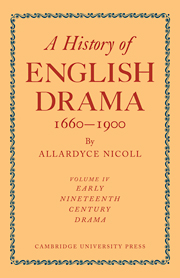Book contents
- Frontmatter
- PREFACE
- Contents
- PART I
- Chapter One THE THEATRE
- Chapter Two THE DRAMATIC CONDITIONS OF THE AGE
- Chapter Three THE ILLEGITIMATE DRAMA
- Chapter Four THE LEGITIMATE DRAMA
- Chapter Five THE STILL-BORN DRAMA
- Chapter Six CONCLUSION
- SUPPLEMENTARY NOTES
- Appendix A THE THEATRES, 1800–1850
- PART II
- SUPPLEMENTARY NÓTES TO THE HAND-LIST OF PLAYS 1800–1850
- INDEX OF PERSONS AND SUBJECTS
Chapter Three - THE ILLEGITIMATE DRAMA
Published online by Cambridge University Press: 07 October 2011
- Frontmatter
- PREFACE
- Contents
- PART I
- Chapter One THE THEATRE
- Chapter Two THE DRAMATIC CONDITIONS OF THE AGE
- Chapter Three THE ILLEGITIMATE DRAMA
- Chapter Four THE LEGITIMATE DRAMA
- Chapter Five THE STILL-BORN DRAMA
- Chapter Six CONCLUSION
- SUPPLEMENTARY NOTES
- Appendix A THE THEATRES, 1800–1850
- PART II
- SUPPLEMENTARY NÓTES TO THE HAND-LIST OF PLAYS 1800–1850
- INDEX OF PERSONS AND SUBJECTS
Summary
Melodramas
From the summary of playhouse conditions given in the preceding chapters, it will be realised that the illegitimate far surpassed in popularity that form of drama which Mr Plumpton Marsh vaingloriously thought to establish in London. Melodrama of a kind was to be seen before 1800; melodrama, like the poor, will no doubt always be with us; but when we think of early nineteenth century theatres we think of them as the home par excellence of spectacularism and of melodramatic effect. There is, accordingly, every justification for beginning a survey of the dramatic literature of the time with this type of despised and neglected entertainment.
Roughly, the melodramas of the period may be classed in three main divisions: the romantic, the supernatural and the domestic; and we may consider this dramatic form as a whole to have developed chronologically from one division to another in the order which is given above. Pixérécourt, who, as we have seen, gave the final impetus to the melodramatic movement, was primarily romantic in aim, and that romantic atmosphere was consolidated in the English theatres through the influence of Sir Walter Scott. Romanticism, however, always loves the strange and the uncanny, and we do not feel surprise when we discover ghosts and goblins freely mingling with more material personages on the romantic stage. Those ghosts and goblins, however, soon come to assume a predominant position, and thus is evolved the Freischütz drama, in which the interest definitely centres in the supernatural effects.
- Type
- Chapter
- Information
- A History of English Drama 1660-1900 , pp. 100 - 154Publisher: Cambridge University PressPrint publication year: 1955



